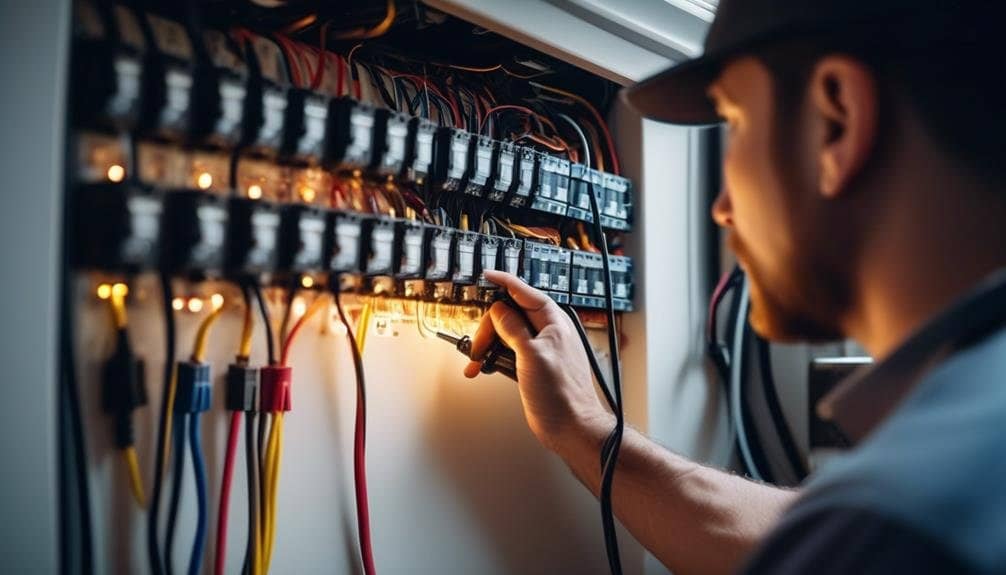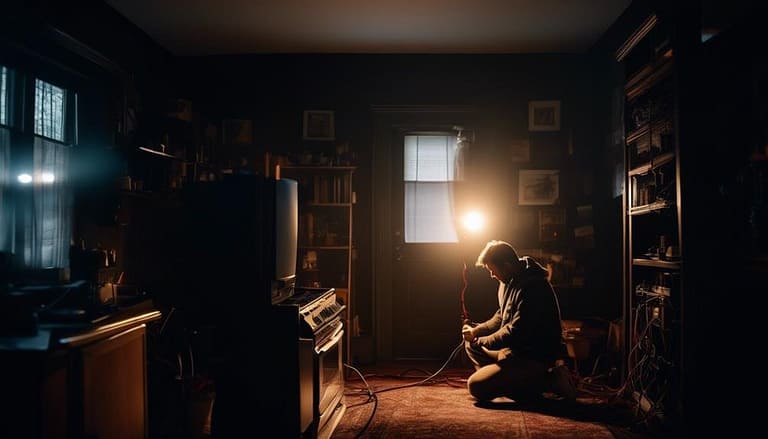Your Guide to Maryland Home Electrical Inspections
Dealing with electrical issues in your Maryland home can be a real hassle. From faulty wiring to outdated systems, keeping your home's electrical setup safe and functional can feel like an uphill battle.
But don't worry, because understanding home electrical inspections can give you the knowledge and tools you need to make sure your home's electrical system is safe and efficient. Whether you're a new homeowner or you've been in your home for a while, knowing the key components of a Maryland home inspection and the common electrical issues found in homes across the state can save you time, money, and headaches in the long run.
So, let's jump into the important information you need to navigate the world of Maryland home electrical inspections.
Key Takeaways
Dealing with electrical issues in your Maryland home can be a real challenge. From faulty wiring to outdated systems, keeping your home's electrical setup safe and functional can feel like a constant battle.
But don't worry, because understanding home electrical inspections can give you the knowledge and tools you need to make sure your home's electrical system is safe and efficient. Whether you're a new homeowner or you've been in your home for a while, knowing the key components of a Maryland home inspection and the common electrical issues found in homes across the state can save you time, money, and headaches in the long run.
So, let's dive into the important information you need to navigate the world of Maryland home electrical inspections.
Importance of Home Electrical Inspections
Regular home electrical inspections are crucial for keeping your home safe and your electrical systems working properly. In Maryland, these inspections are required to make sure your home meets the current electrical codes.
As a homeowner, it's important to have your electrical system checked regularly. A certified home inspector in Maryland can look over your electrical system and find any hidden issues that could be dangerous or cause problems with your system. Taking care of these issues early can help prevent electrical hazards and save you money on big repairs later.
Plus, regular inspections can also help you use less energy and make your electrical system last longer. Making sure your home's electrical system is safe and works well isn't just good for your family, it's also following the rules set by the Maryland State to have a secure and functional home.
It's a smart way to take charge of your home's electrical safety and functionality.
Maryland Electrical Code Requirements

When it comes to setting up the electrical system in your home, it's important to follow the Maryland Electrical Code requirements. These requirements are in place to make sure that your electrical system is safe and functions properly. The Maryland Department of Labor, Licensing, and Regulation oversees these requirements to keep your home safe.
Here are some key Maryland Electrical Code requirements that you should know about:
- Wiring Standards: These standards specify the acceptable wiring practices for homes.
- Outlet and Fixture Placement: This requirement defines where outlets and fixtures should be installed in your home.
- Circuit Breaker Requirements: These requirements outline the use of circuit breakers to protect against electrical overloads.
- Grounding and Bonding Regulations: These regulations help prevent electrical hazards by ensuring proper grounding and bonding.
- Inspection and Testing Procedures: These procedures describe how electrical systems are inspected and tested to make sure they meet the code requirements.
Following these requirements during home inspections is crucial for meeting legal standards and making sure your home's electrical system is safe and functional.
Common Electrical Issues in Maryland Homes

If you're dealing with common electrical issues in Maryland homes, it's important to understand how these issues relate to the Maryland Electrical Code requirements that govern home electrical systems.
When you're inspecting homes in Maryland, it's crucial to pay attention to the following common electrical issues:
- Outdated Wiring: Homes with outdated wiring may not meet current safety standards, which could pose risks of electrical fires and shocks.
- Overloaded Circuits: Older homes with insufficient electrical capacity are especially prone to overloaded circuits, which can lead to safety hazards and functional issues.
- Improperly Installed Components: Faulty installation of outlets and switches may pose safety hazards and contribute to inefficient electrical systems.
Being aware of these issues can help you ensure that your home's electrical system is safe and up to code.
Hiring a Qualified Electrical Inspector

When looking to hire an electrical inspector, it's crucial to verify their licensing with the Maryland Commission of Real Estate Appraisers and Home Inspectors. This is important because it ensures that the inspector is qualified and follows industry standards.
It's essential to consider the experience and track record of potential inspectors. A seasoned inspector is more likely to accurately identify areas of concern.
You should also ask for sample inspection reports from potential inspectors to see how thorough and detailed their work is.
Additionally, make sure to inquire about insurance coverage for liability protection when hiring an inspector. This protects you, the homeowner, from potential damages or oversights during the inspection process.
It's also a good idea to research local home inspectors and read reviews to find a qualified home inspector in Maryland. Feedback from previous clients can provide valuable insight into an inspector's professionalism and competence.
By following these steps, you can ensure that the electrical inspector you hire is qualified to provide a thorough and reliable assessment for potential buyers.
If you need more information on hiring a qualified electrical inspector, feel free to contact us.
Understanding the Electrical Inspection Process

Understanding the electrical inspection process is essential for homeowners. It involves systematically evaluating the wiring, outlets, panels, and other electrical components in a home to ensure compliance with safety codes and regulations. Here's what to expect during the inspection process:
- Initial Assessment: The inspector will thoroughly examine the electrical system, looking for any visible signs of wear and tear, outdated wiring, or potential hazards.
- Testing and Analysis: Various tests will be performed on the electrical system to check for proper functioning, including voltage measurements, outlet polarity checks, and ground fault circuit interrupter (GFCI) testing.
- Documentation and Reporting: After the assessment and testing, the inspector will document any issues found and provide a detailed report outlining the current state of the electrical system, along with recommendations for necessary repairs or upgrades.
Understanding these steps will empower you to have a more active role in the inspection process and gain valuable insights into the condition of the electrical system in your home. This knowledge will help you confidently address any electrical concerns that may arise when dealing with Estate Appraisers and Home inspections in the real estate market.
Frequently Asked Questions
Can a Homeowner Do Their Own Electrical Work in Maryland?
As a homeowner in Maryland, you have the option to take on some electrical work yourself, but there are rules and regulations you need to follow. If you're planning to make changes, additions, or new installations, you'll likely need a permit and inspection. It's really important to stick to the Maryland Electrical Code and local regulations to make sure everything is done safely and up to standard.
What Does a Maryland Home Inspector Look For?
When a Maryland home inspector examines your electrical system, they make sure it's safe, checks the wiring, and ensures everything works properly. They also look for hidden problems using special tools. It's important to have a thorough inspection to keep your home safe and avoid any electrical issues.
What Happens if I Fail Inspection in Md?
So, if your home fails an electrical inspection in Maryland, it means that there are some issues that need to be fixed. It's really important to take care of these problems as soon as possible to make sure your home meets the state's safety standards. Once you've fixed everything, you'll need to schedule another inspection to make sure everything is up to code.
Failing an inspection can cause delays if you're trying to get permits for renovations or other work on your home. Plus, it could also lead to safety risks for you and your family. That's why it's essential to address any issues and get a re-inspection done promptly.
Can a Homeowner Pull a Building Permit in Maryland?
Yes, as a homeowner in Maryland, you have the ability to obtain a building permit for your project. It's important to reach out to the local building department to understand the specific rules that apply to your area. Ensuring that your project complies with codes and regulations is crucial for the safety and success of your endeavor. Keep in mind that some projects may require professional oversight, so it's always wise to do your research and seek guidance when needed.







